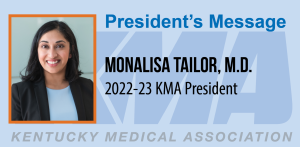 Last month, we emphasized the importance of advocacy. At that time, we were nearly halfway through the session, but knowing the way the legislature often works, there was still a LOT to be debated and discussed. That was so apparent with how the last few days of session went.
Last month, we emphasized the importance of advocacy. At that time, we were nearly halfway through the session, but knowing the way the legislature often works, there was still a LOT to be debated and discussed. That was so apparent with how the last few days of session went.
We have officially entered the veto recess, and the Governor has 10 days (excluding Sundays) to act by either signing or vetoing a bill that has been passed and agreed upon by both chambers of the legislature. If the Governor takes no action within the allotted 10 days, the bill will become law without his signature. When legislators return to Frankfort to complete the final two days of the session on March 29th and 30th, they can try to overturn any vetoes and move additional pieces of legislation toward final passage.
I am grateful to report that one of our KMA priority bills, Senate Bill 12, received final passage and has already been signed by the Governor. SB12 encourages physicians to seek care when needed through a wellness program and ensures that a record of a physician’s participation in such a program is confidential and has additional legal protections. The passage of this legislation is an important step in our overall efforts to improve physician well-being and address workforce issues in the state.
During Physicians’ Day at the Capitol, we heard an extremely moving testimony from Northern Kentucky Medical Society President James Schack, M.D. Dr. Schack shared his story of seeking counseling following a very traumatic medical event involving his neighbor in which he provided emergency care. Dr. Schack has graciously shared his story below for those that weren’t able to attend this year’s PDAC to raise awareness about the new law and its importance. I hope you will take the time to read it and share it with your colleagues who may be hesitant to seek out these important services.
Despite our advocacy and efforts through the Reform Prior Auth campaign (which included a press conference during PDAC in which nearly 100 of you attended), House Bill 134 did not pass this session, despite passing easily out of the House Health Services Committee. KMA is committed to advocating for prior authorization reforms and we will be seeking your assistance over the coming year with that ongoing effort. Thankfully, it appears to be an issue that is popular with the public and many lawmakers, so we are optimistic it will pass in the future.
Finally, I’d be remiss if I didn’t mention the bill that has arguably generated the most debate and discussion this session, Senate Bill 150. SB150 places limits on gender-affirming medical care for those under age 18 in Kentucky by including modified provisions of the earlier-introduced House Bill 470. Many concerning elements of the original version of HB470 weren’t included in the amended SB150 as a result of discussions with legislators, such as the prohibition on mental health treatment. We thank the legislators who worked to remove such elements from the final bill.
However, there are provisions in SB150 that remain extremely problematic, such as limitations on safe medications that can be used to treat gender dysphoria. Our KMA policy supports the utilization of evidence-based standards of care for the treatment of gender dysphoria, including non-surgical medical treatment provided to youth by appropriately trained and experienced healthcare providers. Such standards for appropriate care have been developed and recognized by the nation’s leading healthcare organizations and have proven effective. As such, KMA remains opposed to the legislation.
The legislative session is always a rollercoaster, even during the “short” years. And I believe the 2023 session illustrated the importance of making your voice heard. I’d like to thank each of you who called or met with your legislators, sent messages to support or advocate on an issue, and stayed engaged during this session. The future of our practices, our patients, and our state, depends on it.


